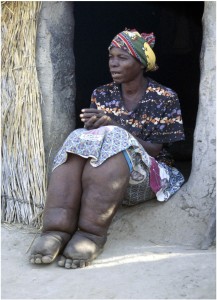
Professor David Molyneux, from the Liverpool School of Tropical Medicine who initiated the study, together with lead author Dr Thanh G.N. Ton from Precision Health Economics in Oakland, and Professor Charles Mackenzie also from Liverpool, explain more about their work in this blog.
What did we do?
We calculated the burden of mental health due to depressive illness and that of those who care for patients who suffer from lymphatic filariasis, also known as elephantiasis, as at least twice the burden calculated by the Global Burden of Disease study. This was the previous reference point for the levels of morbidity of a particular disease as measured by Disability Adjusted Life Years or DALYs.
To date, no such calculations have been made for any of the world’s Neglected Tropical Diseases (NTDs) which affect at least one billion people. These were recently highlighted by the G7 Heads of State at their meeting in Elmau, Germany, as meriting specific attention given they afflict so many of the world’s poorest people.
We emphasise the extent of mental health co-morbidity which sufferers, not only of elephantiasis, but also other blinding and disfiguring diseases which impact on the lives of the poorest and drive them into poverty.
In addition, we highlight that other disfiguring conditions such as Buruli Ulcer, cutaneous leishmaniasis, leprosy, river blindness, blinding trachoma, yaws and sleeping sickness all have a component of their symptoms which can lead to depressive illness as a major co-mordibity.
Impaired mental health

This could result in potential mental health sequelae-stigma, exclusion from societal roles, reduced access to health services, reduced ability to engage in effective employment, reduced marital and educational prospects – all contributing to a worsened mental health status reflected in a high prevalence of depression.
The characteristics of impaired mental health identified by the World Health Organization (WHO) are all major components of neglected tropical diseases but in a recent WHO report on mental health such diseases are not considered a surprising omission.
The burden of mental illness has also been excluded from all recent calculations of the Global Burden of NTDs and by those in the field of mental health. However, there have been few studies which offer an insight into the prevalence of mental illness in NTDs and more are certainly needed.
The high burden of depressive illness is reflected in symptoms such as anxiety, feelings of hopelessness, guilt, worthlessness or helplessness, loss of interest and fatigue which characterise the disability of many NTDs. Hence there is a huge but neglected co-morbidity, previously ignored.
Quantifying neglected tropical diseases
We believe the burden of mental illness requires quantification for NTDs in the many settings where such diseases are common given the global prevalence of these conditions. We consider also that the economic impact of such infections on reduced income due to the inability to work and provide for children’s schooling (who may also be caregivers) results in a significantly reduced family income which may also have a consequence on mental health.
Expenditures incurred in seeking health care, frequently inappropriate and ineffective, will often lead to catastrophic health expenditure in already impoverished families exacerbating the cycle of poverty.
We also calculated the depressive illness in caregivers, those who are required to spend a high proportion of their time caring for those with a major disability. We were unable to find any studies on this topic dealing with this aspect of morbidity in NTDs.
Focusing on appropriate ways of assessing the mental health aspects of NTDs, should enable us to understand this important aspect of co-morbidity of this important group of diseases. The challenges we identify are two fold – firstly to quantify the burden of each disease in terms of the mental illness of patients and caregivers for NTDs, and secondly to seek solutions to address this neglected issue through health care systems where the requisite skills do not exist even if the problem is recognised.
Contributing to global illness
The global mental health burden – and depressive illness in particular – will become one of the largest contributors to global illness over the coming decades yet some of the most prevalent of the world’s infectious diseases have to date been ignored in any calculation.
We hope that this paper will highlight the need to address the research and implementation challenges of this unrecognized burden bringing the mental health burden of sufferers and their carers to the attention of policy makers.
Comments